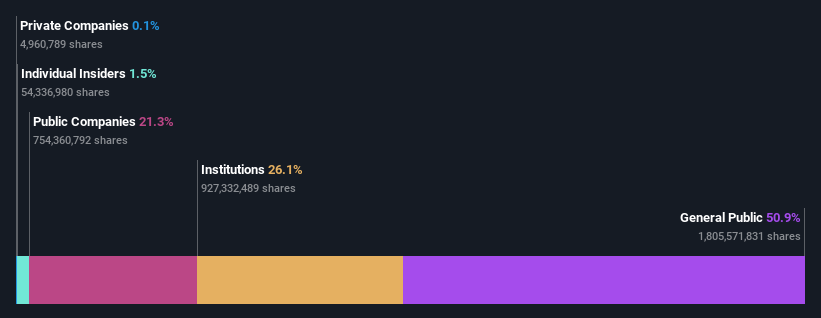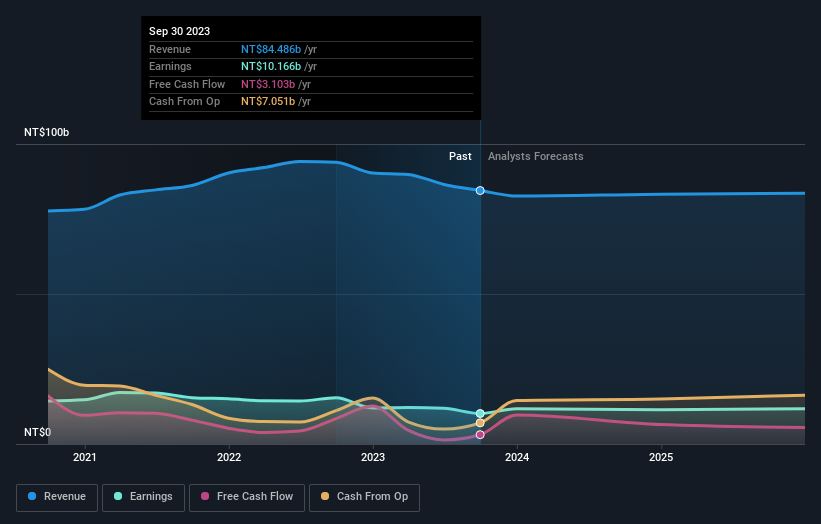Stock Analysis
- Taiwan
- /
- Basic Materials
- /
- TWSE:1102
While institutions own 26% of Asia Cement Corporation (TWSE:1102), retail investors are its largest shareholders with 51% ownership

Key Insights
- Asia Cement's significant retail investors ownership suggests that the key decisions are influenced by shareholders from the larger public
- A total of 25 investors have a majority stake in the company with 47% ownership
- Institutions own 26% of Asia Cement
Every investor in Asia Cement Corporation (TWSE:1102) should be aware of the most powerful shareholder groups. We can see that retail investors own the lion's share in the company with 51% ownership. Put another way, the group faces the maximum upside potential (or downside risk).
Meanwhile, institutions make up 26% of the company’s shareholders. Insiders often own a large chunk of younger, smaller, companies while huge companies tend to have institutions as shareholders.
Let's delve deeper into each type of owner of Asia Cement, beginning with the chart below.
View our latest analysis for Asia Cement

What Does The Institutional Ownership Tell Us About Asia Cement?
Many institutions measure their performance against an index that approximates the local market. So they usually pay more attention to companies that are included in major indices.
We can see that Asia Cement does have institutional investors; and they hold a good portion of the company's stock. This implies the analysts working for those institutions have looked at the stock and they like it. But just like anyone else, they could be wrong. If multiple institutions change their view on a stock at the same time, you could see the share price drop fast. It's therefore worth looking at Asia Cement's earnings history below. Of course, the future is what really matters.

Hedge funds don't have many shares in Asia Cement. Our data shows that Far Eastern New Century Corporation is the largest shareholder with 21% of shares outstanding. Meanwhile, the second and third largest shareholders, hold 5.2% and 3.1%, of the shares outstanding, respectively.
A deeper look at our ownership data shows that the top 25 shareholders collectively hold less than half of the register, suggesting a large group of small holders where no single shareholder has a majority.
Researching institutional ownership is a good way to gauge and filter a stock's expected performance. The same can be achieved by studying analyst sentiments. There are a reasonable number of analysts covering the stock, so it might be useful to find out their aggregate view on the future.
Insider Ownership Of Asia Cement
The definition of company insiders can be subjective and does vary between jurisdictions. Our data reflects individual insiders, capturing board members at the very least. Management ultimately answers to the board. However, it is not uncommon for managers to be executive board members, especially if they are a founder or the CEO.
Most consider insider ownership a positive because it can indicate the board is well aligned with other shareholders. However, on some occasions too much power is concentrated within this group.
We can report that insiders do own shares in Asia Cement Corporation. It is a pretty big company, so it is generally a positive to see some potentially meaningful alignment. In this case, they own around NT$2.2b worth of shares (at current prices). If you would like to explore the question of insider alignment, you can click here to see if insiders have been buying or selling.
General Public Ownership
The general public -- including retail investors -- own 51% of Asia Cement. This level of ownership gives investors from the wider public some power to sway key policy decisions such as board composition, executive compensation, and the dividend payout ratio.
Public Company Ownership
Public companies currently own 21% of Asia Cement stock. It's hard to say for sure but this suggests they have entwined business interests. This might be a strategic stake, so it's worth watching this space for changes in ownership.
Next Steps:
It's always worth thinking about the different groups who own shares in a company. But to understand Asia Cement better, we need to consider many other factors. To that end, you should be aware of the 2 warning signs we've spotted with Asia Cement .
Ultimately the future is most important. You can access this free report on analyst forecasts for the company.
NB: Figures in this article are calculated using data from the last twelve months, which refer to the 12-month period ending on the last date of the month the financial statement is dated. This may not be consistent with full year annual report figures.
New: Manage All Your Stock Portfolios in One Place
We've created the ultimate portfolio companion for stock investors, and it's free.
• Connect an unlimited number of Portfolios and see your total in one currency
• Be alerted to new Warning Signs or Risks via email or mobile
• Track the Fair Value of your stocks
Have feedback on this article? Concerned about the content? Get in touch with us directly. Alternatively, email editorial-team (at) simplywallst.com.
This article by Simply Wall St is general in nature. We provide commentary based on historical data and analyst forecasts only using an unbiased methodology and our articles are not intended to be financial advice. It does not constitute a recommendation to buy or sell any stock, and does not take account of your objectives, or your financial situation. We aim to bring you long-term focused analysis driven by fundamental data. Note that our analysis may not factor in the latest price-sensitive company announcements or qualitative material. Simply Wall St has no position in any stocks mentioned.
About TWSE:1102
Asia Cement
Engages in the manufacturing and selling cement, clinker, ready-mixed concrete, and cement related products in China, Taiwan, and internationally.
Established dividend payer with adequate balance sheet.

